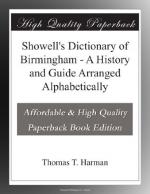Clegg.—Samuel Clegg was born at Manchester, March 2, 1781, but his early years were passed at the Soho Works, where he was assistant to Mr. Murdoch in the gradual introduction of lighting with gas. In 1807 Mr. Clegg first used lime as a purifier and in 1815 he patented the water meter. In addition to his many inventions connected with the manufacture and supply of gas, Mr. Clegg must be credited with the introduction of the atmospheric railways, which attracted so much attention some five-and-forty years ago, and also with many improvements in steam engines.
Collins.—Mr. John Collins, an exceedingly popular man in his day, and quite a local author, made his first appearance here Jan. 16, 1793, at “The Gentlemen’s Private Theatre,” in Livery Street, with an entertainment called “Collins’ New Embellished Evening Brush, for Rubbing off the Rust of care.” This became a great favourite, and we find Collins for years after, giving similar performances, many of them being for the purpose of paying for “soup for the poor” in the distressful winters of 1799, 1800, and 1801. Not so much, however, on account of his charity, or his unique entertainment, must Mr. Collins be ranked among local worthies, as for “A Poetical History of Birmingham” written (or rather partly written) by him, which was published in Swinney’s Chronicle. Six chapters in verse appeared (Feb. 25 to April 7, 17[**]6), when unfortunately the poet’s muse seems to have failed him. As a sample of the fun contained in the seven or eight dozen verses, we quote the first—
“Of Birmingham’s name, tho’
a deal has been said,
Yet a little, we doubt, to
the purpose,
As when “hocus pocus” was
jargon’d instead
Of the Catholic text “hoc
est corpus.”
For it, doubtless, for ages was Bromwicham
called,
But historians, their readers
to bam,
Have Brom, Wich, and Ham so corrupted
and maul’d,
That their strictures have
all proved a sham.
That Brom implies Broom none will dare
to deny,
And that Wich means a Village
or Farm;
Or a Slope, or a Saltwork, the last may
imply,
And to read Ham for Town is
no harm.
But when jumbled together, like stones
in a bag,
To make it a Broom-sloping
town,
Credulity’s pace at such juggling
must flag,
And the critic indignant will
frown.
Tis so much like the Gazetteer’s
riddle-my-ree,
Who, untwisting Antiquity’s
cable,
Makes Barnstaple’s town with its
name to agree,
Take its rise from a Barn
and a Stable.”
Collins’ own comical notion gives the name as “Brimmingham,” from the brimming goblets so freely quaffed by our local sons of Vulcan. Digbeth he makes out to be a “dug bath,” or horsepond for the farriers; Deritend, from der (water).
“Took its name from the swamp where
the hamlet was seated,
And imply’d ’twas the
water-wet-end of the town.”




